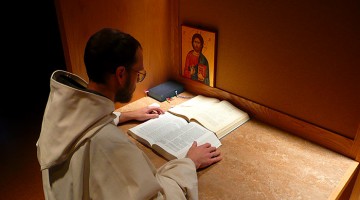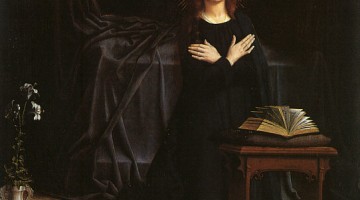The following is the testimony of a 63 year old Grandfather.
As a part of my conversion to Catholicism from Evangelical Protestantism several years ago, I discovered, within my morning quiet times, one of the Catholic traditions of prayer, Lectio Divina. It had been my practice for a long time to do both reading and prayer during my quiet time. During my time of preparation for becoming Catholic, my morning prayers developed, intuitively, into what I would later learn was the Catholic tradition of Lectio Divina.
Prayers had normally been a time of talking to God. But what emerged was a transition to listening. Prayer for the first time became a conversation. And eventually, listening became the center of prayer. Over some months, meditating on my readings evolved into listening to God. Quieting my own thoughts allowed me to begin listening. A key part of that for me was merely stopping my own talking so that I could hear him, knowing that it was him I was hearing and not merely my own thoughts being projected onto God. This gave me the opportunity to change my thinking, to understand things that I had not been able to figure out on my own. During this time my understandings changed significantly. And as I read the Saints, the Popes, the Doctors of the church, they confirmed for me that I was headed in a good direction in learning from what I was hearing in prayer.
God is love, and receiving his love also emerged out of Lectio Divina. Prayer was not just a matter of changing my understandings, but also a matter of opening myself to receiving God’s love in a personal and meaningful way, in richness. After some time, meditation gave way to contemplation. And prayer became a time of silence. It is those silent times that I cherish the most, a time to just be. A time to know his love. A time to fully open myself to his will. In essence, a foretaste of being in the church, the bride of Christ. Sometimes, when I wake up in the morning, I realize that I am already in silent prayer as the Holy Spirit touches my soul while I sleep.
It was clear to me as I learned Lectio Divina that this did not occur as a result of my efforts. There was no step by step procedure involved. Personal competence in prayer was irrelevant. It proceeded out of a strong desire to be his, and this desire proceeded out of my own deficiencies and failures. So, for me, lectio divina was entirely and act of God. My part was merely to say yes when he answered my deep longing and desire to be his. As a friend of mine pointed out to me at the time, this did not happen to me because of anything special about me, but rather because of my need.
One of the things I cherish about being Catholic is the practical function of the saints, the doctors of the church, and the magisterium in my life. I didn’t have this as a protestant. But now, when I learn something new, I have somewhere to turn to evaluate whether I am listening to God or merely listening to myself. The church has always had the function of preserving the truth. And that is of practical importance to me as I learn.
In the case of Lectio Divina, I was happy to discover that what had developed in my quiet times is within the traditions of the church. There were other times in which the teachings of the church helped me to overcome long time, strongly held misunderstandings. This has been for me the joy of becoming Catholic. And when I hear the litany of the saints sung in Mass, I am hearing the names of my good friends.












No Comment